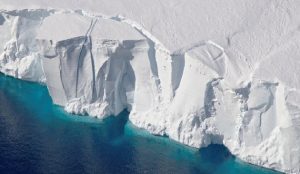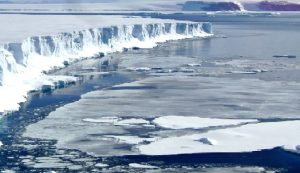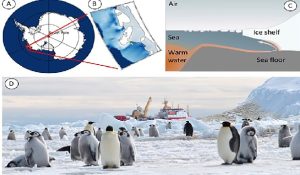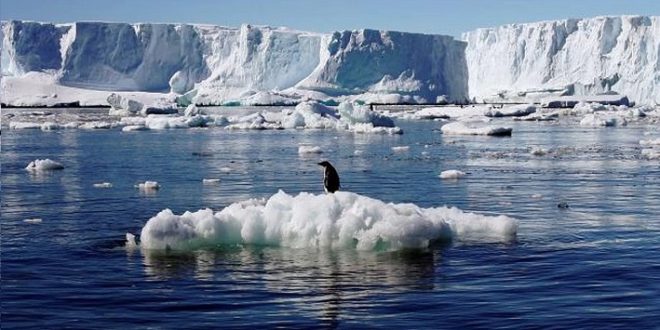31-03-2023
LONDON: Rapidly melting Antarctic ice is dramatically slowing down the flow of water through the world’s oceans and could have a disastrous effect on global climate, the marine food chain, and even the stability of ice shelves, new research says.
The “overturning circulation” of the oceans driven by the movement of denser water towards the sea floor helps deliver heat, carbon, oxygen and vital nutrients around the globe.
 However, deep ocean water flows from the Antarctic could decline by 40 percent by 2050, according to a study published on Wednesday in the journal Nature, which warned of effects that would last “for centuries to come”.
However, deep ocean water flows from the Antarctic could decline by 40 percent by 2050, according to a study published on Wednesday in the journal Nature, which warned of effects that would last “for centuries to come”.
“That’s stunning to see that happen so quickly,” said Alan Mix, a paleo-climatologist at Oregon State University and co-author on the latest Intergovernmental Panel on Climate Change (IPCC) assessments, who was not involved in the study.
“It appears to be kicking into gear right now. That’s headline news.”
If the model holds true, the deep ocean current will be “on a trajectory that looks headed towards collapse”, said University of New South Wales (UNSW) climate professor Matthew England who coordinated the study.
As temperatures rise, freshwater from Antarctica’s melting ice enters the ocean, reducing the salinity and density of the surface water and diminishing that downward flow to the sea’s bottom.
While past research has looked at what could happen to similar overturning circulation in the North Atlantic, the mechanism behind a doomsday scenario that would see Europe suffer from an Arctic blast as heat transport falters less has been done on Antarctic bottom water circulation.
 Scientists relied on about 35 million computing hours over two years to crank through a variety of models and simulations up to the middle of this century, finding deep-water circulation in the Antarctic could weaken at twice the rate of decline in the North Atlantic.
Scientists relied on about 35 million computing hours over two years to crank through a variety of models and simulations up to the middle of this century, finding deep-water circulation in the Antarctic could weaken at twice the rate of decline in the North Atlantic.
UNSW emeritus professor John Church, who was not involved in the study, said there were many uncertainties about the impact of declining deep ocean circulation but “it seems almost certain that continuing on a high greenhouse gas emission pathway will lead to even more profound effects on the ocean and the climate system,” Church said.
“The world urgently needs to drastically reduce our emissions to get off the high-emission pathway we are currently following.”
The study team included lead author Qian Li of the Massachusetts Institute of Technology and co-authors from the Australian National University and Australia’s Commonwealth Scientific and Industrial Research Organization (CSIRO).
‘Disaster scenarios’
 The effect of meltwater on global ocean circulation has not yet been included in the complex models used by the IPCC to describe future climate change scenarios, but it is going to be considerable, England said.
The effect of meltwater on global ocean circulation has not yet been included in the complex models used by the IPCC to describe future climate change scenarios, but it is going to be considerable, England said.
Ocean overturning allows nutrients to rise up from the bottom with the Southern Ocean supporting about three-quarters of global phytoplankton production, the base of the food chain, said a second study co-author Steve Rintoul.
“If we slow the sinking near Antarctica, we slow down the whole circulation and so we also reduce the amount of nutrients that get returned from the deep ocean back up to the surface,” said Rintoul, a fellow at CSIRO.
The study’s findings also suggest the ocean would not be able to absorb as much carbon dioxide as its upper layers become more stratified, leaving more CO2 in the atmosphere. (Int’l News Desk)
 Pressmediaofindia
Pressmediaofindia




